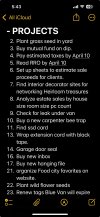Oogiem
0
I was using Omnifocus and DEVONThink in a similar fashion for years. When I dropped DEVONThink for Obsidian I decided to also jump ship and move out of Omnifocus as well.For me the downsides of doing it all in a tool clearly not specifically designed for task management but making it work with the Tasks Plug-In adds just enough friction on the front end of creating the project note to make me stop to decide if I really have the bandwidth to work on that project now. The day to day work is so much simpler than it ever ws before that I'm willng to put up with some front end work.But I am also not enjoying that I need to create a project in Omnifocus and create a project in my note taking system. And when they are done in omnifocus archive in my note taking system. Just feels like lots of steps and micromanagement.
Add the built in templates function and it's simple to have a pre-formatted project note.It is so convenient that I am highly tempted to move my project list from paper into Obsidian.
In Obsidian I do it by having a tasks heading in my project note. I happen to use the Tasks Plugin and within it my contexts are tags in a hierarchical tagging system. In YAML front matter (now called properties) I put a tag for my AOF's which handles the linking to higher horizons. I then created simple dashboard notes to slice and dice my system in several different views. I put links to those presentation notes in a _Home note that is the top thing on my phone and tablet when I open Obsidian. Heres a sample of the code that creates the phone and busniness phone contexts of my tasks.I guess that is what I am trying to figure out.... How do I connect my next actions, project lists, and notes and supporting documents (not long term file storage) together? And bonus points if I can connect Higher Horizons as well..
Code:
# Phone
```tasks
not done
is not blocked
(starts before tomorrow)
(path does not include 05.01_Hold_Projects )
tag includes Phone
short mode
```
# Phone Business
```tasks
not done
is not blocked
(starts before tomorrow)
(path does not include 05.01_Hold_Projects )
tag includes #Context/BusinessPh
short mode
```

